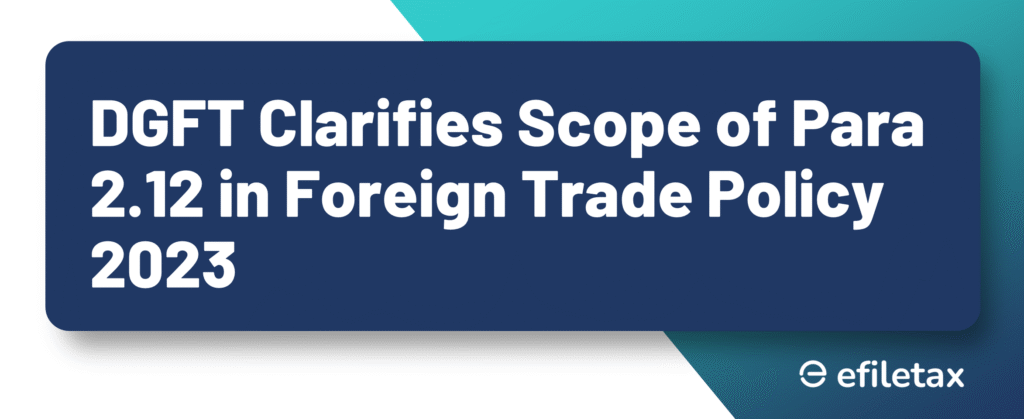
DGFT Clarification on Para 2.12 of FTP 2023
The DGFT has recently issued a clarification regarding Para 2.12 of the Foreign Trade Policy 2023, which deals with import restrictions under the ITC (HS) classification. This update is crucial for Indian importers, customs authorities, and export-import consultants to ensure compliance with conditions laid out under Schedule 1.
What Does Para 2.12 of FTP 2023 State?
As per Para 2.12 of the FTP 2023:
“Import of ‘Restricted’ items or items requiring authorisation under Schedule I of ITC (HS) is permitted only against a valid authorisation or as per conditions notified.”
This means that:
- Items listed as “restricted” cannot be freely imported.
- Even if such items are part of broader export promotion schemes (like Advance Authorisation or EPCG), specific import permission is still needed.
Key DGFT Clarification: Dated 15 July 2025
The Directorate General of Foreign Trade (DGFT) clarified that:
Para 2.12 applies even in cases where policy provisions under schemes (such as Advance Authorisation or EPCG) seem to allow import. If the item is restricted, separate import authorisation is mandatory.
Why this matters:
Many traders assumed that scheme benefits override ITC (HS) restrictions — this clarification puts that to rest.
When Does Import Authorisation Become Mandatory?
| Situation | Is Import Authorisation Required? |
|---|---|
| Import of unrestricted item under Advance Authorisation | No |
| Import of restricted item under Advance Authorisation | Yes – separate authorisation needed |
| Import under EPCG Scheme if item is restricted in ITC (HS) | Yes – authorisation is mandatory |
| Import under DFIA Scheme (Duty Free Import Authorisation) | Same rule applies – check restriction |
Legal Reference: Schedule I of ITC (HS)
To check if an item is restricted:
- Visit the DGFT ITC (HS) Schedule I classification portal
- Enter the HS Code or description
- Look for column “Policy Condition”
- If marked “Restricted”, import is only allowed with valid DGFT authorisation
Expert Insight
Tip from Efiletax Trade Consultant:
Always verify the latest DGFT Trade Notices and Notification updates before proceeding with any import planning under FTP-linked schemes. Many customs disputes arise when importers assume Advance Authorisation or EPCG gives blanket exemption.
Implication for Indian Importers
- Importers must re-evaluate their product list under FTP-linked schemes.
- Compliance teams should align FTP permissions with ITC (HS) conditions.
- Any mistake could lead to detention, demurrage, or penal proceedings under Customs Act.
Compliance Tip
Use this simple checklist before importing under FTP:
- ✅ Check HS Code classification
- ✅ Verify if item is marked “Restricted” in ITC (HS)
- ✅ Cross-check FTP scheme conditions
- ✅ Apply for DGFT import authorisation if needed
Conclusion
The DGFT clarification on Para 2.12 of FTP 2023 clears the air around scheme-based imports and restricted items. Traders can no longer rely solely on scheme provisions — they must also comply with ITC (HS) conditions. For smooth, penalty-free import clearance, make sure your documentation matches both the FTP and Customs rules.
Need help with DGFT authorisation or trade compliance? Talk to Efiletax’s experts today.
Summary
DGFT clarifies that Para 2.12 of FTP 2023 mandates import authorisation for restricted items under ITC (HS), even when imported under Advance Authorisation or EPCG schemes.
FAQs
Q1. Can restricted items be imported under Advance Authorisation?
Only with separate DGFT import authorisation — scheme benefit alone isn’t enough.
Q2. Where can I check if an item is restricted?
Refer to Schedule I of ITC (HS) at dgft.gov.in using your product’s HS Code.
Q3. Does this apply to EPCG or DFIA schemes too?
Yes. The same Para 2.12 rule applies — restricted items always need separate import authorisation.